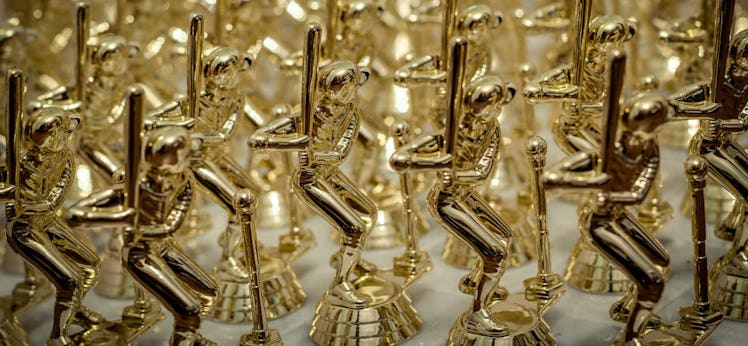Why Did Kids Start Getting Participation Trophies For Sports?
Welcome to the second "Era of Good Feelings."

In the world of kids sports, there are 2 main philosophies about winning and losing. There’s the James Harrison school of thought: Your participation trophy is killing everyone’s will to compete and entitling a generation to expect rewards without doing jack. And then there’s the all-kids-are-winners camp, which says mounted pieces of plastic make kids feel special and encourage them to keep playing. But really, who wins?
When Did The Participation Trophy Start?
It’s hard for Little League historians to say, but this trend probably kicked off in the second half of the 20th Century. There’s a whole HBO Real Sports documentary you could watch, but the gist is that there was a California initiative in the 80s to boost the self-esteem of inner city youth. “We thought, especially for kids in struggling communities, if we just told them they were great they would believe it, and then they could achieve more because they were certain they were great,” researcher Ashley Merryman told HBO. During that time there was also The Karate Kid, which made unathletic children everywhere think they could crane kick their way to a trophy.
Flickr / Rick Ramirez
The Trophy Manufacturers Did Their Part
Even before this post-Bad News Bears world, Merryman noted in a New York Times op-ed that the trophy industry evolved from a mom-and-pop industry to a mass-produced product marketed heavily to teachers and coaches during the 60s. Aha! It’s Big Trophy that started this! Granted, there’s no straight line between the rise of the trophy industry and the ubiquity of participation trophies — but if you made your living selling these things, wouldn’t you want more winners to give them to?
The same doc, a trophy manufacturer said their sales increased 500 percent in the last 40 years. Indeed the trophy industry rakes in $2 billion a year in the U.S. and Canada, putting earnings on par with weight loss services and online dating.
Flickr / Paul Curto
Bad News Bears, Karate Kids, And Revenge Of The Nerds
Back to that cultural wave of 80s that celebrated the nerds, misfits and the assorted uncool. This movement turned the jocks into villains and the underdogs into heroes. It did away with that 60s, Vince Lombardi ethos where, “winning isn’t everything, but it’s the only thing.” The generation that came of age during the Nerd Revolution passed on their touchy-feelings to their kids. And here we are. One interesting side note, is that according to Lombardi’s nephew, the quote was taken out of context. Steve Werner told NPR that “I get upset when people who didn’t understand my uncle’s goal for everyone to try their best think that he would be tough for toughness sake instead of making his players the best that they could be.”
And Are These Trophies Helping?
Psychologists have competing perspectives. Some support the notion that rewarding participation breeds entitlement, and some feel it encourages future participation. Research shows that rewarding effort and participation in young children makes them more likely to try harder in the future. Research also shows that participation in sports leads to better grades, higher self-esteem and an increased chance of attending college, especially for girls. Looks like winners might be overrated, Donald.